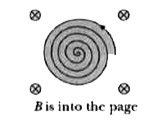From the matrix equation AB = AC we can conclude B = C provided that
A
A is singular
B
A is non-singular
C
A is symmetric
D
A is square
Video Solution
Text Solution
The correct Answer is:B
|
Answer
Step by step video, text & image solution for From the matrix equation AB = AC we can conclude B = C provided that by Maths experts to help you in doubts & scoring excellent marks in Class 11 exams.
Updated on:21/07/2023Topper's Solved these Questions
- DETERMINANTSBOOK - OBJECTIVE RD SHARMACHAPTER - DETERMINANTSEXERCISE - Chapter Test
30 Videos
- DETERMINANTSBOOK - OBJECTIVE RD SHARMACHAPTER - DETERMINANTSEXERCISE - Section II - Assertion Reason Type
6 Videos
- CONIC SECTIONSBOOK - OBJECTIVE RD SHARMACHAPTER - CONIC SECTIONSEXERCISE - Section I - Solved Mcqs
1 Videos
- DISCRETE PROBABILITY DISTRIBUTIONSBOOK - OBJECTIVE RD SHARMACHAPTER - DISCRETE PROBABILITY DISTRIBUTIONSEXERCISE - Exercise
40 Videos
Similar Questions
Knowledge Check
From the matrix equation AB=AC we can conclude B=C provided the matrix A is
Am×mBn×nCn×mDm×nFrom the matrix equation AB=AC, we conclude B=C provided.
AA is singularBA is non-singularCA is symmetricDA is a squareFrom the matrix equation AB = AC, which one of the following can be concluded ?
AB = C for any matrix ABB = C, if A is singularCB = C, if A is non-singularDA = B = C for any matrix A
From the following V−T diagram we can conclude:-
_E01_054_Q01.png)
View Solution
Regarding the nature of the charge, we can conclude that :
View SolutionThe electric field lines are closer together near object A than they are near object B. We can conclude that.
View SolutionFrom the electrochemical series, it can be concluded that :
View SolutionIf A, B, c are three square matrices such that AB=AC implies B=C, then the matrix is always a/an
View Solution
